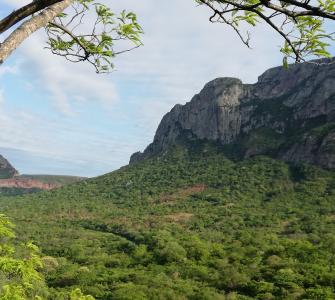The Chiquitania region in eastern Bolivia is rich in biodiversity, home to a vast dry forest connecting the Amazon and the Chaco. Spanning approximately 230,000 kilometers, the region is home to over 300,000 people, including indigenous communities that depend on the region’s forests and other natural resources. This forest is a significant carbon sink responsible for storing roughly 1.6 gigatons of carbon and providing ecosystem services such as soil preservation, water regulation, and biodiversity conservation, all critical to local livelihoods.
After a decade of recurring wildfires, the Chiquitania region now faces critical decisions. Unsustainable land use practices, among them widespread slash-and-burn agriculture, extensive cattle grazing, and mechanized soy production, have produced one of the highest global deforestation rates and drastically increased the region’s vulnerability to wildfires. In 2024, Bolivia experienced a catastrophic wildfire season resulting in widespread destruction of forest ecosystems, loss of biodiversity, and damage to infrastructure such as health centers. Indigenous communities lost forest resources, agricultural land, and their homes. Economic losses from the fires exceeded US$ 300 million—approximately 12% of Chiquitania’s regional GDP. The destruction of the 2024 wildfire season exceeded previous years, and will take decades to reverse.
Despite efforts by the Bolivian government to restore affected areas, recovery from the 2024 wildfire season is hampered by funding gaps and a lack of technical capacity. At the end of 2024, the World Bank began preparation of the ‘Targeted Restoration and Economic Enhancement of Chiquitania Forests for Sustainability’ (TREES Bolivia) project, aimed at restoring degraded forest landscapes and improving local populations’ resilience. The geographic space of the study will be the municipalities of Concepción and San Ignacio de Velasco from Santa Cruz department. CSF is supporting this project by developing a five-year strategic roadmap, incorporating identification of scalable value chains with positive environmental impact, opportunity assessment, and consultation with key stakeholders.
The project will deliver:
- Value Chain Identification: the project will identify agroforestry value chains based on existing documentation and stakeholder consultation, producing a prioritized list.
- Diagnosis of Prioritized Ventures and Strategic Recommendations: a detailed analysis of selected value chains identification of bottlenecks, legal & institutional constraints, and existing support mechanisms.
- Technical Assistance Packages and a 5-Year Roadmap: development of tailored assistance packages for each value chain, including proposed investments and implementation timelines, and a five-year roadmap outlining key actions and stakeholder roles.
CSF aims to establish a roadmap that strengthens actors in these value chains, supports the resilience of local populations, and provides technical assistance to communities adopting sustainable agroforestry practices to reduce fire risk.
The project is funded by the World Bank and will be carried out in close coordination with the Foundation for the Conservation of the Chiquitano Forest (FCBC), with support from the World Bank, and the FAO Rome Investment Center.
Photo Credit: Shutterstock.com/ Matancadeporco

